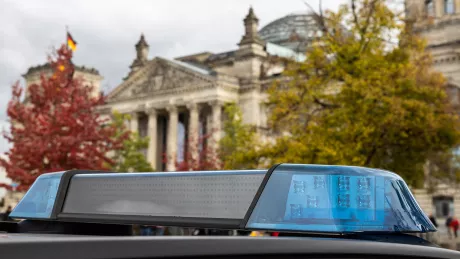
D-Trust Signature Card – for a Qualified Electronic Signature
Sign Electronic Documents with Legal Certainty
The qualified signature card replaces the handwritten signature in the digital world. It helps companies, self-employed individuals and public authorities in digitising their business processes by providing legally binding signatures for electronic documents – precisely for when processes require the written form.
The Qualified Signature Card from D-Trust
The signature card enables a digital signature to be used wherever legal certainty is required. For example, users can sign contracts electronically in a legally binding manner, process public tenders via electronic award platforms and submit court documents electronically. One prominent example is the electronic waste verification procedure.
Product Details
The qualified signature card is always issued to a natural person, making it possible to validate who provided the signature. The signature card cannot be transferred to other persons. Recipients of the electronically signed document can be certain that the signature actually comes from the sender and that the content has not been subsequently altered. In this way, documents with a qualified electronic signature are much better protected against forgery than their paper counterparts. The qualified signature ensures the integrity and authenticity of a document.
There are three different variants of the qualified signature card: Single signature cards require a PIN to be entered on the card reader for each qualified electronic signature. Batch signature cards (M100) enable up to 100 documents to be signed after a PIN is entered. Multi-signature cards are used in server environments for automated workflows and enable an unlimited number of documents to be signed after a PIN is entered.
- Emissions trade
- Electronic waste verification procedure (eANV)
- Contracts
- Temporary employment
- Business correspondence
- Notices
- VE test certificates (Packaging Act)
- Electronic tax return with ELSTER-Plus
- Electronic civil status register
- Online dunning procedures
- Quality management documentation
- Properietary right application at the German Patent and Trademark Office (DPMA)
All variants of the D-Trust signature card always contain two certificates: the qualified signature certificate and an advanced certificate, which can be used for authentication and encryption purposes. The D-Trust signature card is valid for up to three years.
While the name of an organisation can be entered in the certificate as an option, it is not possible to store an individual professional attribute. The Profession D-Trust Card can be used to store a professional attribute.
The signature cards contain a qualified certificate from the eIDAS PKI for the purpose of the signature and a non-qualified certificate for authentication. Cryptographic hash function SHA-512 is supported. The supported signature schemes are RSA-PSS for standard cards and ECDSA for batch or multi-cards.
Single signature cards use RSA keys, whereas batch signature cards use ECC keys. Multi-signature cards are also based on ECC keys and are primarily used in server environments for automated workflows.
- The PIN and PUK are delivered separately with a PIN letter.
- The D-Trust Card Assistant software for card initialisation and changing the PIN is provided free of charge.
- If needed, you can obtain a chip card reader from the REINER SCT shop.
- If required, we offer middleware for RSA-based cards such as Nexus Personal or cryptovision SCinterface. Cryptovision SCinterface middleware is available for ECC-based cards.
- The signature software of a range of providers is supported.
- Please see our Information on supported readers and partner software.
Prices for D-Trust signature cards
Signature cards are always ordered via the D-Trust portal. It is essential that you register in the D-Trust Portal and place the order via a personal account. Under this personal account, you will later receive additional functionalities in the D-Trust Portal, such as reordering without further identity verification or a blocking option for your card.
Signatur D-Trust Card 5.1 Std.
- with RSA procedure
- for natural persons
- Use at the workplace
- valid for 3 years
* Prices in euros (€), plus statutory VAT.
Signatur D-Trust Testcard 5.1 Std.
- No personal identification required
- with RSA procedure
- valid for 3 years
* Prices in euros (€), plus statutory VAT.
Signatur D-Trust Card 5.1 M100
- with ECC procedure
- for natural persons
- Use at the workplace, in a safe environment (supervised)
- valid for 3 years
* Prices in euros (€), plus statutory VAT.
Signatur D-Trust Testcard 5.1 M100
- No personal identification required
- with ECC procedure
- valid for 3 years
* Prices in euros (€), plus statutory VAT.
Signatur D-Trust Card 5.1 Multi
- with ECC procedure
- for natural persons
- Operation only in a secure environment
- valid for 3 years
* Prices in euros (€), plus statutory VAT.
Signatur D-Trust Testcard 5.1 Multi
- No personal identification required
- with ECC procedure
- suitable for server-based use in automated workflows
- valid for 3 years
* Prices in euros (€), plus statutory VAT.
Downloads
Areas of Application
Frequently Asked Questions
In order to apply for a signature card for digital signatures, the law requires the personal identification of the person making the application. This ensures a high level of legal certainty. You need to present a valid identity card or passport that is valid for at least four weeks.
The following alternatives are available for submitting an application:
- PostIdent procedure: Use the eID function via the app or visit a post office.
- NotarIdent: Have yourself identified at notary’s offices in Germany and the EU.
- BotschaftsIdent: Contact any German embassy worldwide.
- Identification at an IHK (Chamber of Industry and Commerce): Over 60 Chambers of Industry and Commerce in Germany offer a signature service that will guide you through the application process and identify you at the same time. You can find a list here (german)
- BehördenIdent or OfficerIdent: Use internal organisational identification options.
To create a qualified electronic signature (QES) with a D-Trust signature card, you need a card reader and possibly additional software, depending on the application you wish to use. The actual signature is triggered within your application by entering a second factor. With the signature card, this second factor is the individually assigned PIN.
Applications such as Adobe Reader, MS Outlook, Mozilla Thunderbird or the “Electronic Certificate of Origin” cannot communicate directly with the reader and require middleware, such as Nexus Personal, as additional software.
The qualified electronic signature (QES) serves as a digital replacement for a handwritten signature, making it possible to sign purchase contracts, orders or offer letters electronically in a legally binding manner. Signatures are always linked to natural persons.
In contrast, an electronic seal guarantees that the documents originate from a specific organisation and are authentic. It acts as the digital equivalent of a company stamp or official seal. Seals are linked to legal entities.
The signature cards are valid for up to three years. The validity period will be shown when you place your order. Signature cards are renewed by reordering them after the maximum period of validity has expired.
Using signature cards is subject to the legal requirements of the respective country and industry. In the EU, for example, they have to comply with the standards of the eIDAS Regulation.
Do you have any questions about signature cards?
Our sales team will be happy to assist you. Please feel free to contact us:
D-Trust Sales Team
+49 (0)30 2598 - 0
vertrieb@d-trust.net











